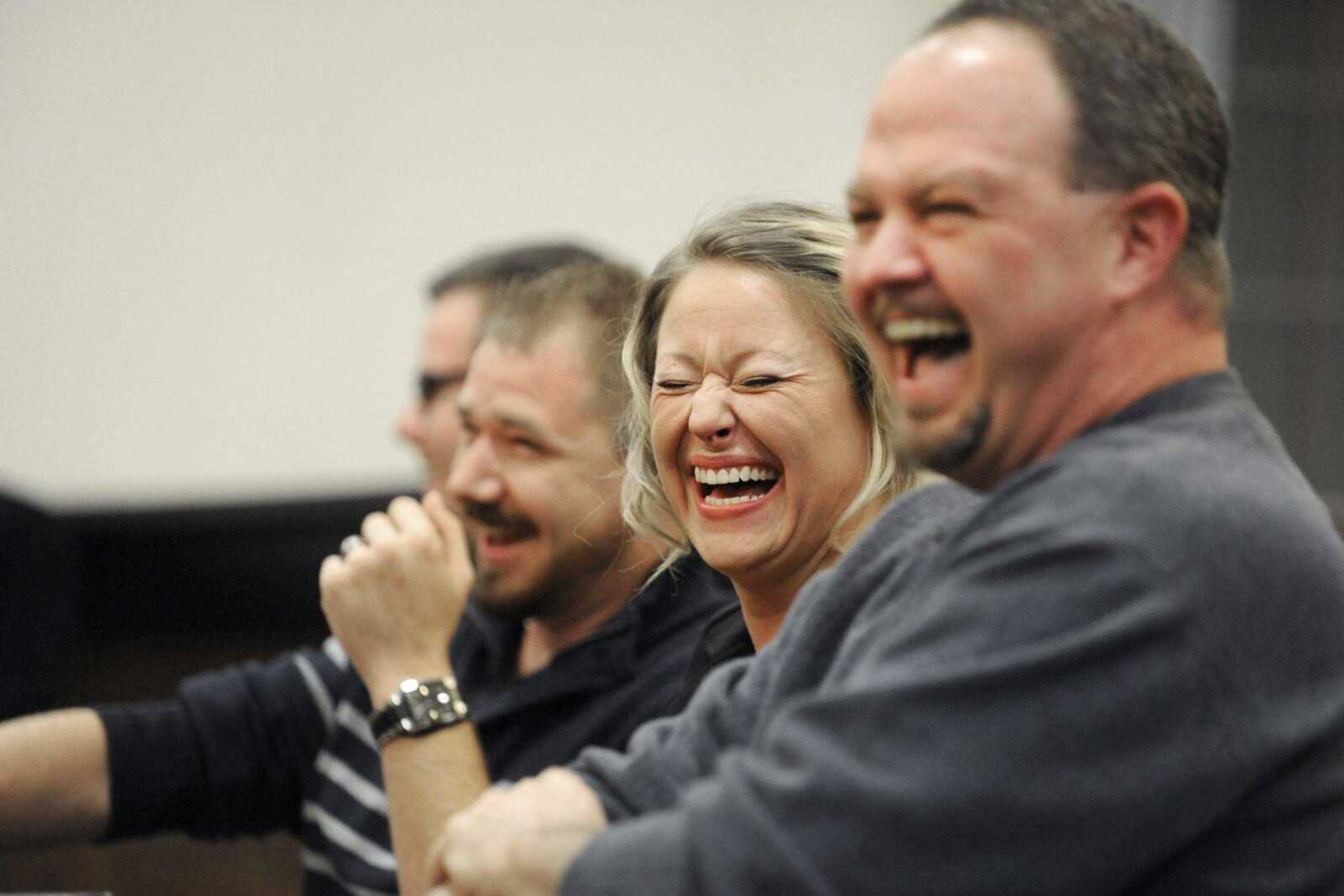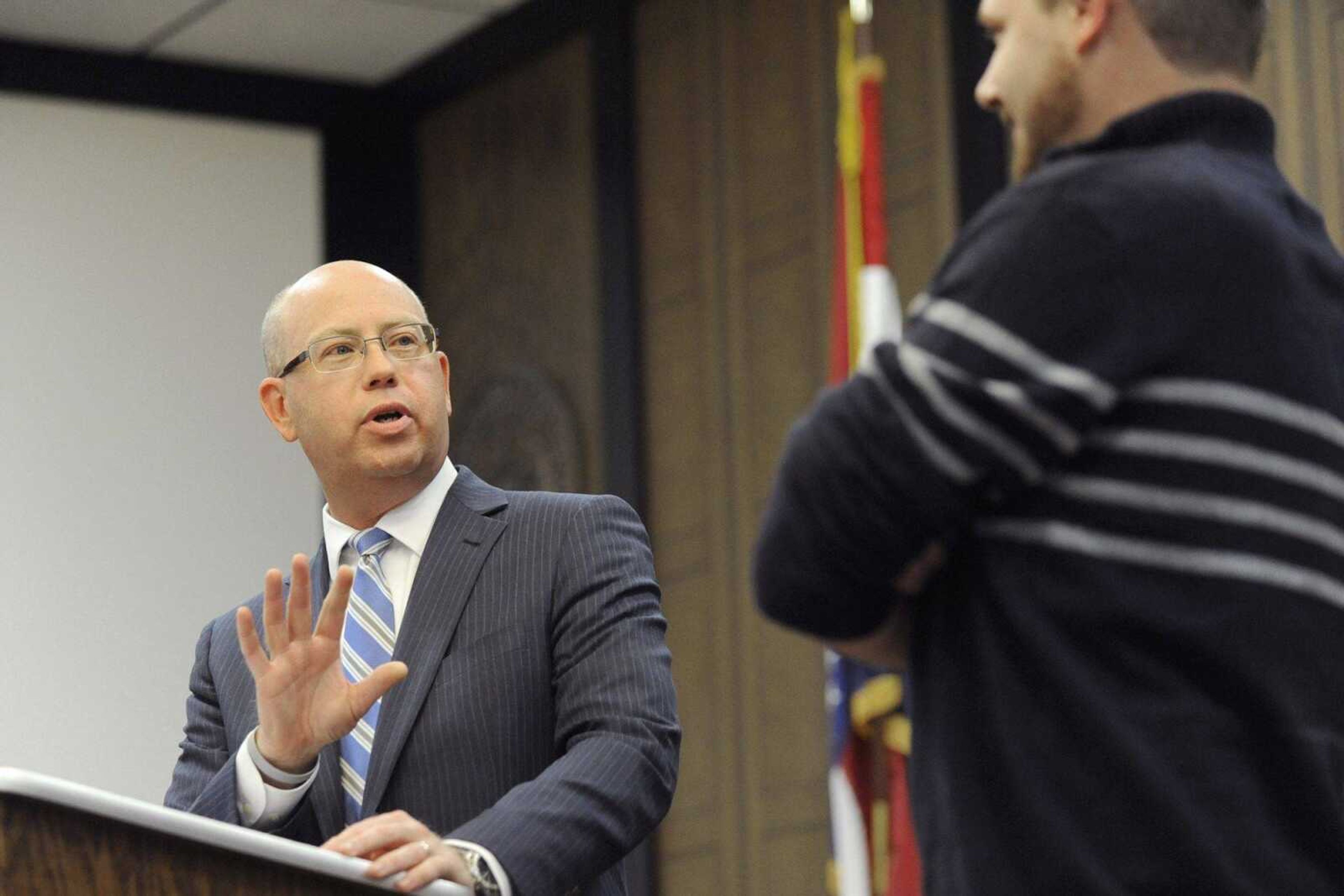A group of seven admitted in a packed courtroom last week their lives were falling apart -- they could have ended up losing their children forever, in jail or dead.
Instead, they turned their lives around. They formed better relationships, avoided incarceration, overcame their addictions, got jobs and even found religion. And they had a state-run drug court program to thank for it.
Now that Carrie Bell has held down employment for 16 months and given her children a secure home where dinner is on the table and the bills are paid on time, she said she now is a "real mother."
"People said I should have been doing those things all along. But for me it just wasn't like that," said Bell, 29, of Cape Girardeau, addressing the attendees of the 32nd Judicial Circuit's adult drug court program graduation, held Thursday night at the Cape Girardeau County Courthouse in Jackson.
Bell had been to rehab and jail for drug abuse, and she was out of control, she said.

But after she was charged with drug-related felonies, Bell, with her six classmates, were out of options. Save one.
The judicial circuit's adult drug court takes referrals for a rehabilitation program from the three counties it serves -- Bollinger, Cape Girardeau and Perry. The referrals, according to program rules, can be given only to nonviolent offenders who plead guilty to their offenses from defense and prosecution attorneys, probation officers or the state's children's division. A circuit's drug court administrator must also accept referrals for someone to become a participant.
A drug court "team," which includes Associate Circuit Judge Scott A. Lipke, Sheila Sauer, the drug court administrator, prosecutors and defenders, law enforcement, a tracker, public defenders, probation officers and substance abuse and mental health counselors, guide participants through the 18-month to two-year program that has four levels with specific treatment goals.
Frequent drug testing, meetings with their probation officers and about 30 appearances before the judge, along with many other stringent rules, are required. Participants also pay for a portion of the program cost -- $1,200 to $1,800 each.
Overall, the state touts the program as a financial success -- estimates from October's report by the drug courts coordinating commission for Missouri show savings in fiscal 2014 was about $14,500 for each person who was diverted from state prison into treatment court, totaling $27 million.
While saving money is important to drug court administrators, Sauer said the program's main goal is rehabilitation.
"They are definitely not just a number to us," Sauer said. "We spend a year and a half to two years with them. We get to know them personally."
In the 32nd Judicial Circuit, a graduation with six to eight participants is held about every six months. All participants in the program -- there are 40 -- are required to attend. In 13 years, the local circuit has graduated 160.
Lipke opens the graduation ceremonies, where he details the rigid requirements of the program.
"It's very tedious," he said. "A lot of these folks come to us with no driver's license, no job. And as compassionate as we can be at times, we hold their feet to the fire and make sure they get there."
Participants in one level of the program receive a phone call at 5:45 a.m. and have to come in for a drug test by 10 a.m. As a team, the administrators communicate about the drug court program constantly, with meetings and emails throughout the day and texts at night, Lipke said.
When someone breaks the rules, the team takes it personally, Lipke told the participants -- many of whom claimed close relationships had been formed with the judge, counselors and other team members.
"You don't get to see the reactions on their faces when someone's had a drug test, and we see for sure that they've relapsed," he said. "But it affects everyone."
Sauer said one of the unique things of the drug court program is the team makes the decisions on how to best handle each participant individually -- the levels of the program are guidelines.
"That's not easy," she said, "because when treating addiction, you really have to be ready for just about anything. And then we always try to fit the incentive or sanction to what they did. "
Lipke also introduces each graduate and shares with the audience a short version of their entrance into the program.
Bell agreed with Lipke she was a challenge when she began drug court.
"At the beginning, I didn't think I was going to make it," she said.
But the program began to turn that feeling around.
"This isn't just a second chance at life. I know this is my last chance," she said Thursday. "I just feel like I've missed out, and [my children] missed out on so much, that I don't want them to miss out on any more because of me."
Bell wasn't alone in finding that overcoming her problems brought her closer to her family.
Taylor Moore, 22, of Cape Girardeau is closer to his parents because of the ways he changed in the program.
"A lot of things have been handed to me with sobriety, but closer relationships with the people I have in my life is definitely the one I feel the most appreciation for, " he said.
Jeff Dye, 44, of Jackson said although religion isn't a part of the program or Alcoholics Anonymous, he gained a new faith throughout his recovery experience.
"You see, about two years ago, I pretty much just wanted to die," he said.
Dye attempted suicide in November 2012 during his battle with alcohol and drug abuse.
"God was the first one there. He loved me so much, he didn't let me," Dye said. "Then he made sure I found Sheila, and I told her if she didn't let me into the program, I wasn't going to make it."
Dye is writing a book, which he said is "about a boy that growing up always felt like he didn't fit in to any social circle, so he tried them all. Even as far back as childhood he felt different. When he found drugs and alcohol at a very early age, he realized it gave him wonderful power to have the confidence to fit in anywhere. Later, that power tries to kill him."
State data show 90 percent of participants in its court programs are arrest-free, while 60 percent to 80 percent of drug users released from prison are rearrested.
eragan@semissourian.com
388-3632
Pertinent address:
100 Court St., Jackson, MO
Connect with the Southeast Missourian Newsroom:
For corrections to this story or other insights for the editor, click here. To submit a letter to the editor, click here. To learn about the Southeast Missourian’s AI Policy, click here.







